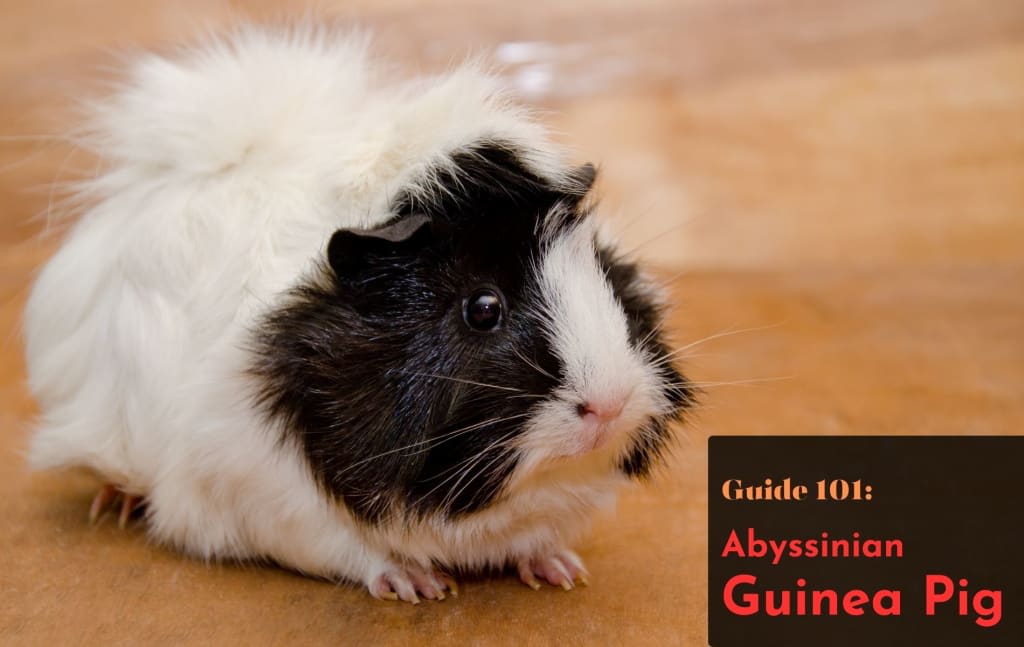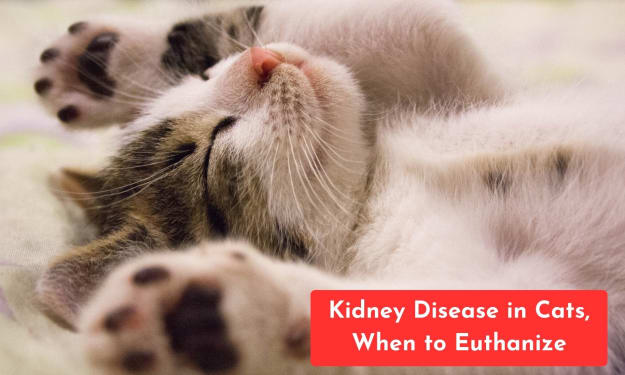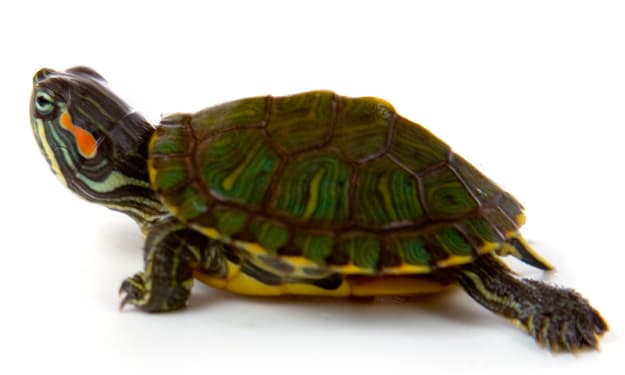Abyssinian Guinea Pig Care 101
A Comprehensive Guide

If you're considering getting an Abyssinian guinea pig as a pet, you're in for a treat! These adorable creatures, with their unique whirlpool-shaped coat, make excellent companions. However, it's essential to understand that caring for an Abyssinian guinea pig requires effort and attention. This comprehensive guide will cover everything you need to know about providing the best care for your Abyssinian piggy.
Introduction to Abyssinian Guinea Pigs
Abyssinian guinea pigs are a breed known for their distinctive coat. Unlike other short-haired guinea pig breeds, Abyssinians have swirls of hair all over them, giving them a charmingly unkempt and shabby look. Their fur grows from an even number of rosettes, usually 8, arranged into two lines. These whirlpool-shaped rosettes make Abyssinians stand out among other guinea pig breeds.
Although their name suggests otherwise, Abyssinian guinea pigs do not originate from the Abyssinia region in Africa. Instead, they come from South America and are one of the oldest varieties of guinea pigs. Abyssinians traveled to Europe in the 16th century and eventually found their way to America as pets.
Temperament of Abyssinian Guinea Pigs
Abyssinian guinea pigs have a docile and gentle temperament but are energetic and playful. They love to explore and play, so providing them with plenty of toys, chew toys, and opportunities for exercise is essential. Abyssinians are naturally curious, making them relatively easy to train compared to other guinea pig breeds.
These guinea pigs can be very friendly and affectionate pets, especially if you spend time taming them and building a bond. They are known for their curious nature and playful personality. While it's true that some guinea pigs may be more outgoing than others, Abyssinian's friendliness is also influenced by their character.
Also Read: Is F3 Savannah Cat the Right Pet for You?
Though rare, Abyssinians may bite if they feel threatened or uncomfortable. It's important to handle them gently and respect their boundaries. If your Abyssinian guinea pig shows signs of discomfort, such as fidgeting or wriggling, it's best to give them space. Pay attention to their behavior and reaction to prevent any potential biting incidents.
Getting an Abyssinian Guinea Pig
Abyssinian guinea pigs are famous, so finding one shouldn't be difficult. Pet stores often sell Abyssinians, but you can also consider professional breeders or local animal shelters as potential sources. When choosing a guinea pig, look for a healthy, active one with a shiny coat and bright eyes.
Abyssinian guinea pigs can make great pets for both children and adults. They are playful and curious, and their low-maintenance fur makes them easier to groom than long-haired breeds. However, it's important to note that owning any pet, including an Abyssinian guinea pig, requires time, effort, and commitment.
Housing for Abyssinian Guinea Pigs
Providing a suitable habitat for your Abyssinian guinea pig is crucial for their well-being. They can live both indoors and outdoors, but it's crucial to maintain a temperature range of 65 to 79 degrees Fahrenheit to prevent hypothermia or heat stroke. Whether inside or outside, their enclosure should be positioned away from direct sunlight, draughts, vents, and heaters.
The size of the cage is also important. Abyssinian guinea pigs require a spacious cage, especially if you have more than one piggy. A single guinea pig needs a cage that offers at least 7.5 square feet of space, while a pair needs a minimum of 7.5 to 10.5 square feet. Enough space is essential to prevent boredom, stress, and destructive behavior.
Read Also: Can Guinea Pigs Eat Apples?
Various cages are available, including commercial cages and DIY options like Coroplast and cube grid cages. Commercial cells should be carefully selected to ensure they meet the size requirements. DIY cages offer more flexibility in terms of size and can be more cost-effective. Whichever type of cage you choose, ensure it provides enough space for your Abyssinian guinea pig to move around comfortably.
Grooming an Abyssinian Guinea Pig
Grooming an Abyssinian guinea pig is relatively straightforward. Their short fur and rosettes require minimal maintenance compared to long-haired breeds. Brushing their coat once a week with a soft bristle brush is usually sufficient to keep their fur looking healthy and shiny. Brushing their hair in the direction it naturally lays is important to avoid causing discomfort.
In addition to brushing, other grooming tasks include cleaning their ears and trimming their nails. Cleaning the ears every couple of weeks helps prevent infections, while regular nail trimming is necessary to prevent overgrowth and mobility issues. For bathing, Abyssinians generally don't require frequent baths unless they are particularly dirty or unable to groom themselves properly.
Diet and Nutrition for Abyssinian Guinea Pigs
Proper nutrition is crucial for the health and well-being of Abyssinian guinea pigs. A balanced diet includes hay, vegetables, fruits, and pellets. Hay should be offered daily in unlimited amounts, as it aids digestion and helps wear down their teeth. Timothy hay is the best option, as it is low in fat, protein, calcium, and calories.
Vegetables are essential to their diet, providing necessary nutrients and vitamin C. Leafy greens such as romaine lettuce, cilantro, kale, and parsley are great choices. Fruits can be given as occasional treats but should not be given daily due to their high sugar content. Pellets should be grass hay-based, low in fat, and fed in moderation.
Feeding your Abyssinian guinea pig twice a day, with a consistent feeding schedule, helps maintain their health. It's important to avoid overfeeding, as obesity can lead to various health issues. Additionally, certain foods, such as dairy products, meat, bulb foods, avocados, and onions, are toxic to guinea pigs and should be avoided.
Exercise and Enrichment for Abyssinian Guinea Pigs
Exercise and mental stimulation are essential for the overall well-being of Abyssinian guinea pigs. Providing them with opportunities for exercise outside of their cage is important to prevent boredom and encourage physical activity. A playpen, paddling pool, or even a hallway can be a designated play area.
Toys, tunnels, hideaways, chew toys, and obstacle courses can be placed in their play area to keep them entertained. It's important to ensure their safety by removing potential hazards and preventing access to other animals. If your guinea pig exercises outdoors, ensure the weather is suitable and they have access to shade and shelter.
Traveling with Your Abyssinian Guinea Pig
Tips for safe and stress-free travel
Ensuring their safety and comfort is vital when traveling with your Abyssinian guinea pig. Use a secure and well-ventilated carrier to transport them. Line the carrier with their familiar bedding to provide comfort and reduce stress. Keep the carrier stable during transport and avoid sudden movements.
Preparing a travel-friendly environment
Bring along the essentials if your journey involves an overnight or extended stay. Pack enough food, water, and bedding to last the trip. Set up a temporary habitat with familiar items from their regular enclosure to provide comfort and security.
Health and Common Issues of Abyssinian Guinea Pigs
Monitoring the health of your Abyssinian guinea pig is essential to ensure their well-being. A healthy Abyssinian should have bright eyes, enthusiasm for food, agile movement, a glossy coat, and a clean nose and bottom. However, specific health issues, including vitamin C deficiency and bumblefoot, can affect guinea pigs.
Vitamin C deficiency can lead to scurvy, which affects collagen production and can cause various health problems. Providing a diet rich in vitamin C is essential to prevent this deficiency. Bumblefoot is an infection of the foot pad that can lead to inflammation and sores. Regular foot inspections and proper cage maintenance can help prevent this condition.
If you notice any signs of illness or discomfort in your Abyssinian guinea pig, it's important to seek veterinary attention. Guinea pigs are prey animals and often hide signs of disease, so early detection is crucial. Regular vet check-ups and proper care are essential for maintaining your Abyssinian's health and well-being.
Wrapping Up
Caring for an Abyssinian guinea pig requires time, effort, and commitment. By providing proper housing, nutrition, grooming, exercise, and monitoring their health, you can ensure a happy and healthy life for your Abyssinian piggy. With their unique appearance and playful nature, Abyssinians make lovely companions for children and adults alike. So, if you're ready for a delightful and rewarding pet, an Abyssinian guinea pig might be your perfect choice!
Additional Information:
- Abyssinians can live alone but prefer to be with their kind.
- Guinea pigs are prone to vitamin C deficiency, so it's crucial to provide a diet rich in vitamin C.
- Mental stimulation and exercise are crucial to prevent boredom and encourage physical activity.
- Regular veterinary check-ups are essential for maintaining the health of your Abyssinian guinea pig.
- Avoid overfeeding and provide a balanced diet to prevent obesity and other health issues.
Disclaimer: Some of the part of this post includes content written by AI.
About the Creator
Amir Hossain
I blog on everything and anything— hoping my blogs will make your days a bit happier!






Comments
There are no comments for this story
Be the first to respond and start the conversation.